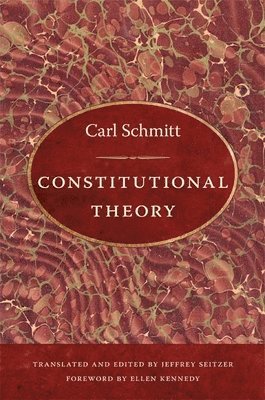
- Format
- Häftad (Paperback / softback)
- Språk
- Engelska
- Antal sidor
- 488
- Utgivningsdatum
- 2008-01-01
- Förlag
- Duke University Press
- Översättare
- Jeffrey Seitzer
- Illustrationer
- 2 tables, 5 figures
- Dimensioner
- 233 x 154 x 30 mm
- Vikt
- Antal komponenter
- 1
- Komponenter
- Paperback
- ISBN
- 9780822340706
- 660 g
Constitutional Theory
- Skickas från oss inom 2-5 vardagar.
- Fri frakt över 249 kr för privatkunder i Sverige.
Passar bra ihop
De som köpt den här boken har ofta också köpt Who's Afraid of Gender? av Judith Butler (inbunden).
Köp båda 2 för 725 krKundrecensioner
Fler böcker av Carl Schmitt
-
Politisk teologi
Carl Schmitt
-
Political Theology Four Chapters on the Concept of Sovereignty
Carl Schmitt, George Schwab, Tracy B Strong
-
Political Theology II
Carl Schmitt
-
The Leviathan in the State Theory of Thomas Hobbes
Carl Schmitt
Recensioner i media
Constitutional Theory represents an unparalleled milestone in Schmitt translations. Indispensable to scholars in political and legal theory, it will undoubtedly occupy a pivotal place in debates over Schmitt. In itself, the Seitzer-Thornhill introduction constitutes one of the most authoritative and intellectually sophisticated contributions to this field in decades.Joseph W. Bendersky, author of Carl Schmitt: Theorist for the Reich What Heideggers Being and Time is to European philosophy, Constitutional Theory is to European political philosophy. It is astounding that one of the most important works of twentieth-century political theory has remained untranslated until now. But this edition makes the wait worthwhile. John P. McCormick, University of Chicago
Övrig information
Carl Schmitt (18881985) was a leading German political and legal theorist. Among his many books are The Crisis of Parliamentary Democracy, Political Romanticism, The Concept of the Political, Political Theology, and Legality and Legitimacy, which is also published by Duke University Press. Jeffrey Seitzer teaches at Roosevelt University. He is the author of Comparative History and Legal Theory: Carl Schmitt in the First German Democracy and the editor and translator of Carl Schmitts Legality and Legitimacy. Ellen Kennedy is Professor of Political Science at the University of Pennsylvania. She is the author of Constitutional Failure: Carl Schmitt in Weimar, also published by Duke University Press. Christopher Thornhill is Professor of Politics at the University of Glasgow. He is the author of German Political Philosophy: The Metaphysics of Law.
Innehållsförteckning
Foreword / Ellen Kennedy xv Translator's Preface xvii An Introduction to Carl Schmitt's Constitutional Theory: Issues and Context / Jeffrey Seitzer and Christopher Thornhill 1 Constitutional Theory Schmitt's Preface 53 Part I. Concept of the Constitution 57 1. Absolute Concept of the Constitution (The Constitution as United Whole) 59 2. Relative Concept of the Constitution (The Constitution as a Multitude of Individual Laws) 67 3. The Positive Concept of the Constitution (The Constitution as the Complete Decision over the Type and Form of the Political Unity) 75 4. Ideal Concept of the Constitution ("Constitution" in an exemplary sense, thus named because of a certain content) 89 5. The Meanings of the Term "Basic Law," Basic Norm or Lex Fundamentalis *(Summarizing Overview) 94 6. Origin of the Constitution 97 7. The Constitution as Contract (the Genuine Constitutional Contract) 112 8. The Constitution-Making Power 125 9. Legitimacy of a Constitution 136 10. Consequences of the Theory of the Constitution-Making Power of the People's Constitution-Making Power in Particular 140 11. Concepts Derived from the Concept of the Constitution (Constitutional Change, Statutory Violation of the Constitution, Constitutional Suspension, Constitutional Dispute, High Treason) 147 Part II. The Rechtsstaat Component of the Modern Constitution 167 12. The Principles of the Bourgeois Rechtsstaat 169 13. The Rechtsstaat Concept of Law 181 14. The Basic Rights 197 15. Separation (So-Called Division) of Powers 220 16. Bourgeois Rechtsstaat and Political Form 235 Part III. The Political Component of the Modern Constitution 253 17-1. The Theory of Democracy, Fundamental concepts 255 18. The People and the Democratic Constitution 268 19. Consequences of the Political Principle of Democracy 280 20. Application of the Political Principle of Democracy to Individual Areas of State Life 286 21. Boundaries of Democracy 302 22-2. The Theory of Monarchy 308 23-3. Aristocratic Elements in Modern Bourgeois Rechtsstaat Constitutions 318 24-4. The Parliamentary System 328 25. Historical Overview of the Development of the Parliamentary System 343 26. Overview of the Possibilities for the Formation of the Parliamentary System 359 27. The Parliamentary System of the Weimar Constitution 362 28. Dissolution of Parliament 373 Part IV. Constitutional Theory of the Federation 379 29. Fundamental Concepts of a constitutional Theory of the Federation 381 30. Consequences of the Fundamental Concepts of the Constitutional Theory of the Federation 396 Appendix: The Weimar Constitution 409 Notes 441 Biographical Notes 464 Index 465


